Trek Finds Carbon Frames Produce Nearly 3 Times the CO2 of Alloy in its First Sustainability Report
Trek has become one of the first major bike brands to release an in-depth study into its environmental impact and ways it can improve sustainability in the future.
The Sustainability Report covers everything from the carbon emissions created by different models in its ranges, to recycled plastic usage, and different shipping options. We have taken a look through Trek's report to find some of the more interesting takeaways.
1. Carbon frames produce three times carbon emissions than alloy
The most interesting part of Trek's new report is a study completed on the carbon emissions created by the raw materials, manufacturing and transporting its bikes. Trek decided to investigate the carbon emissions for four of its most popular models (Madone, Marlin, Rail and Fuel EX), then broke each down by the different spec options. The biggest takeaway from this study is the significant impact carbon fibre can have on emissions, with carbon frames appearing to produce around three times higher emissions than their aluminium counterparts*.
To take the Fuel EX range as an example, the highest level alloy framed bike appears to produce ≈120 kg C02e on Trek's chart, way below the average in this test of 174 kg C02e. However, the base-level carbon Ful EX creates just above the average emissions level at ≈175 kg C02e. At the very top of the Fuel EX range, on a bike that contains a lot of carbon components alongside a carbon frame, the emissions rise even further to an estimated ≈225 kg C02e for the 9.9 X01 and XTR models. Incredibly, just the Fuel EX carbon frameset sits at around ≈80 kg C02e, meaning a carbon frame alone is not far off the emissions of a complete alloy Fuel EX 8 (≈120kg).
Of course, emissions aren't everything when it comes to the environmental impact of a bike and, as RC covered back in 2018, there is a lot more nuance to the debate of which material is more environmentally friendly. However, the new data from Trek does paint a picture that in terms of emissions, an alloy bike could be the better choice for the environment.
The numbers in the report appear to cover the raw materials, transportation and manufacturing emissions needed to create a bike, but the study doesn't include potential costs to recycle or dispose of the frames and components after use. In the report, Trek does recognise that depending on the use of the bike the carbon emissions cost can be mitigated or entirely offset and through its carbon emissions testing Trek has now found ways to potentially improve its manufacturing and supply chain processes.
*We reached the three times emissions figure by measuring the pixels on the chart supplied by Trek in the report. We found that the Fuel alloy frame is 74 pixels with 211 pixels for the carbon version. A very similar result can be found for the Rail eMTB with 61 pixels for the alloy frame and 221 for the carbon offering. We don't have the exact figures from Trek, which would provide more accurate results, but it is still interesting to see a ballpark figure of around a three times emissions increase for carbon frames.
2. eMTBs Come with a Big Emissions Impact
In news that will come as a surprise to no one, choosing an eMTB has a sizeable increase in the emissions of a bike.
Trek's Rail model was included in the study and the average emissions for this bike sit at 229 kg C02e. Once again, the frame material can play a big part in this total as the lower end alloy Rail 5 falls around the average of 174 for its emission but flying past this point is the top of the range Rail 9.9, which is the biggest carbon emitter from the dataset with a total of well over 300 kg C02e.
In the breakdown of parts, forks are the largest contributor at 16%, with batteries totaling 15% of the emissions and the frame assembly responsible for 11% of the Rail's carbon emissions.
3. A Full-Suspension Frame Doesn't Necessarily Mean More Emissions
While suspension can add a significant cost to a bike, with an almost $2000 gap between the lower end Marlin and Fuel EX bikes tested in this study, there does not seem to be that much emissions difference in adding suspension to a bike.
Trek's entry-level hardtail the Marlin was found to have average carbon emissions of 116 kg C02e, with the largest source being the frame assembly at 17%, whereas the Fuel EX has average carbon emissions of 153 kg C02e across the different models. Similar to the Marlin, the largest source is the frame assembly at 18%.
While this figure suggests an additional environmental cost of a full-suspension frame, the increase in the average figure mostly comes from the split between carbon and alloy frames. Looking at the emissions chart featured above, you can see that the alloy Fuel EX models do sit at or below some of the emissions levels of the alloy Marlin hardtails. It's worth saying that the comparison between these bikes is not a like for like in spec, but it's interesting to see a well-specced alloy full suspension bike can have the same carbon emissions as an entry-level hardtail.
4. Air Freight has 84 times the carbon footprint of Ocean Freight
No matter what the frame material or design of your bike, there's another factor that adds significant emissions - shipping. Transporting bikes around the world is one of the largest contributors to Trek's global emissions but the brand does have plans to reduce its footprint in this area.
There are two main ways to ship bikes, air freight and ocean freight, and in this contest, there's a clear environmental winner as ocean freight produces 84 times fewer emissions than air freight. In the report, Trek does note that while ocean freight is more efficient, cheaper and environmentally friendly it is far slower than using air to get products around the globe. To combat the massive negative effect of sending things by air, Trek has stated it wants to reduce air freight by 75% of pre-2020 levels by 2024. To achieve this lofty goal it has come up with the idea of reducing the number of trips needed by predicting which products will be in highest demand throughout the year.
Part of Trek's plan to reduce emissions from transportation also includes furthering its idea of consolidated shipping. Trek's sole distributor in Europe, located in the Netherlands, has put in place a weekly shipping window for retailers to combine multiple orders into a single shipment to reduce the impact of transporting the products. The new plan also means holding warranty, individual orders and inventory orders throughout the week to ship on one designated day in batch shipments.
5. 433,600 lbs of plastic packaging removed since 2020
Although we have already covered Trek's massive efforts to reduce its plastic packaging, the new report does reveal some interesting stats in the breakdown of the 433,600 lbs of plastic already removed. The number that stood out to us most was that Trek has removed 95% of landfill waste in the packaging of the Rail eMTB.
6. Trek is the only major bike manufacturer to release a sustainability report
While we have covered plenty of schemes and pledges in the past Trek's sustainability report is the first of its kind from one of the major bike manufactures. Alongside the report's coverage of each bike's carbon emissions and the impact of its business Trek also covered environmental goals for the future. The 10 areas Trek is focusing on improving are:
- Reducing the use of air freight
- Consolidate shipments to retailers
- Increase reliance on renewable energy
- Reduce corporate travel
- Increase reliance on alternative materials
- Create zero-landfill manufacturing facilities
- Establish and protect new trails
- Remove plastic waste from packaging
- Increase access to bike share
- Shift cycling mode share
Yes, it's going to be easy to pick apart individual practices and stats in this report, but you have to commend Trek for being so open and forthcoming with the data and being one of the brands at the forefront of cleaning up the bike industry. We commend Trek on its pledges and hope that it inspires other brands to follow its lead.
Author Info:
Must Read This Week
Sign Up for the Pinkbike Newsletter - All the Biggest, Most Interesting Stories in your Inbox
PB Newsletter Signup
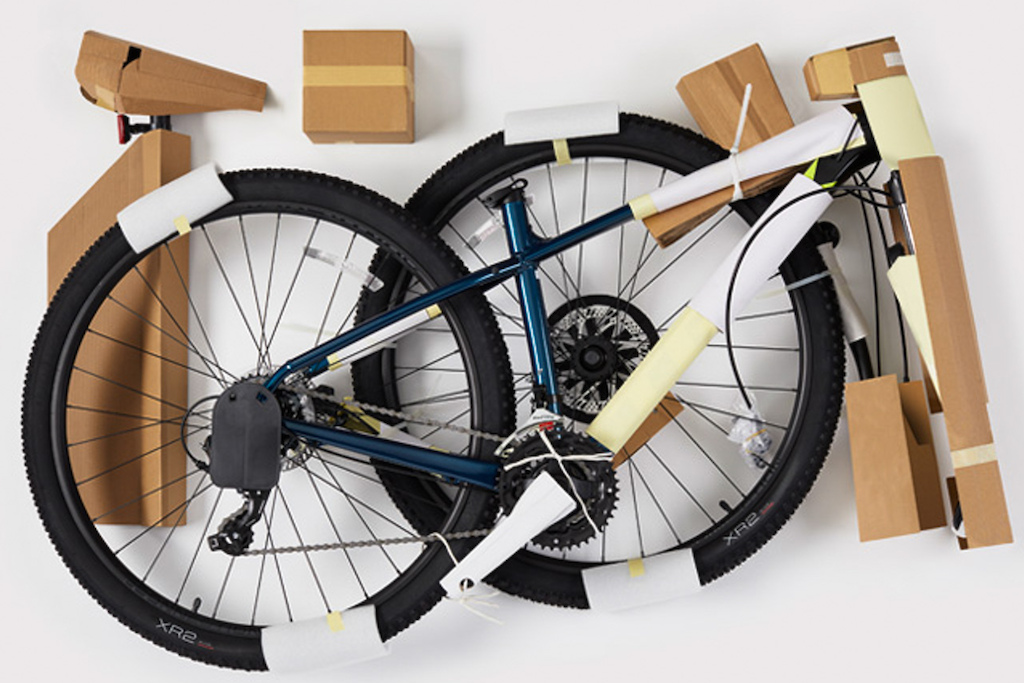
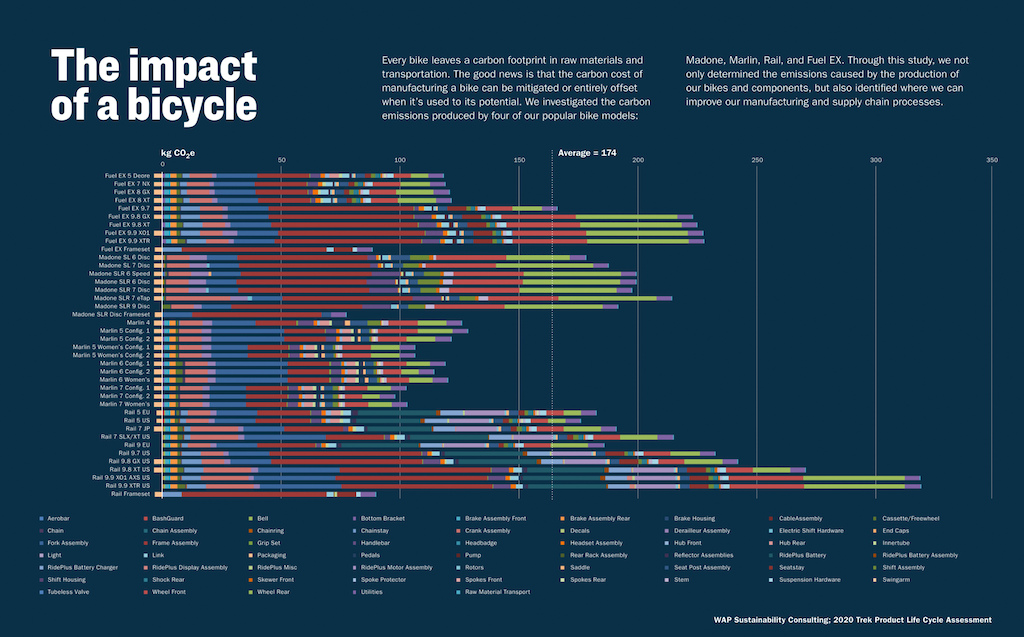
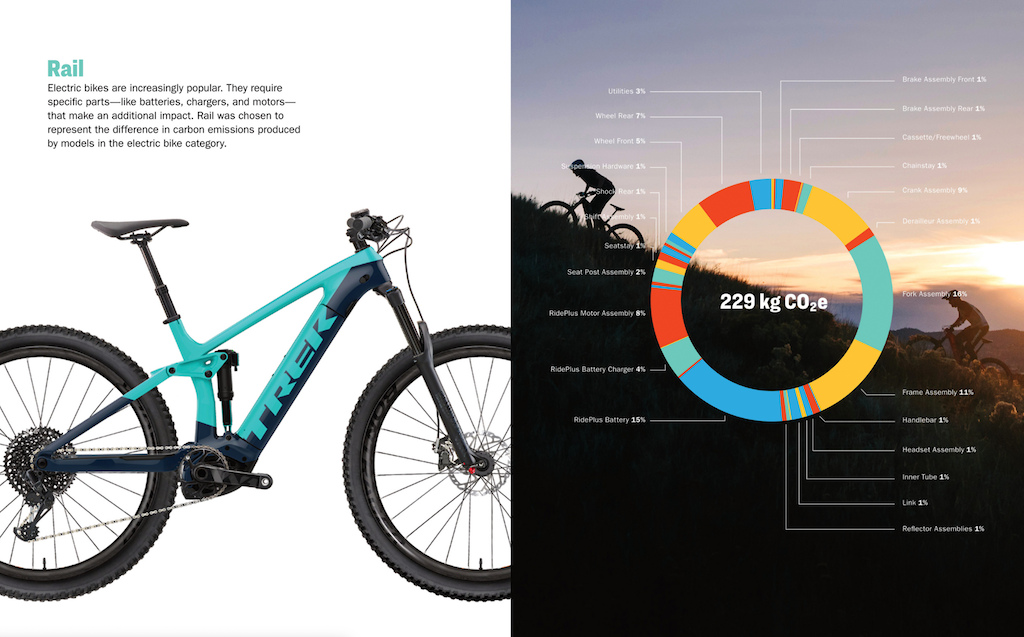
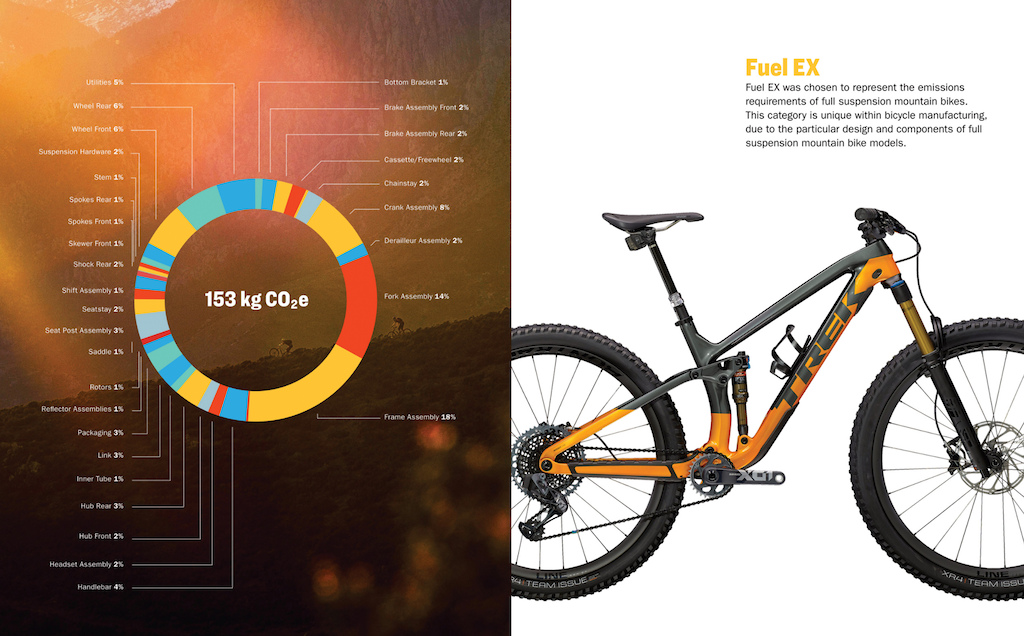
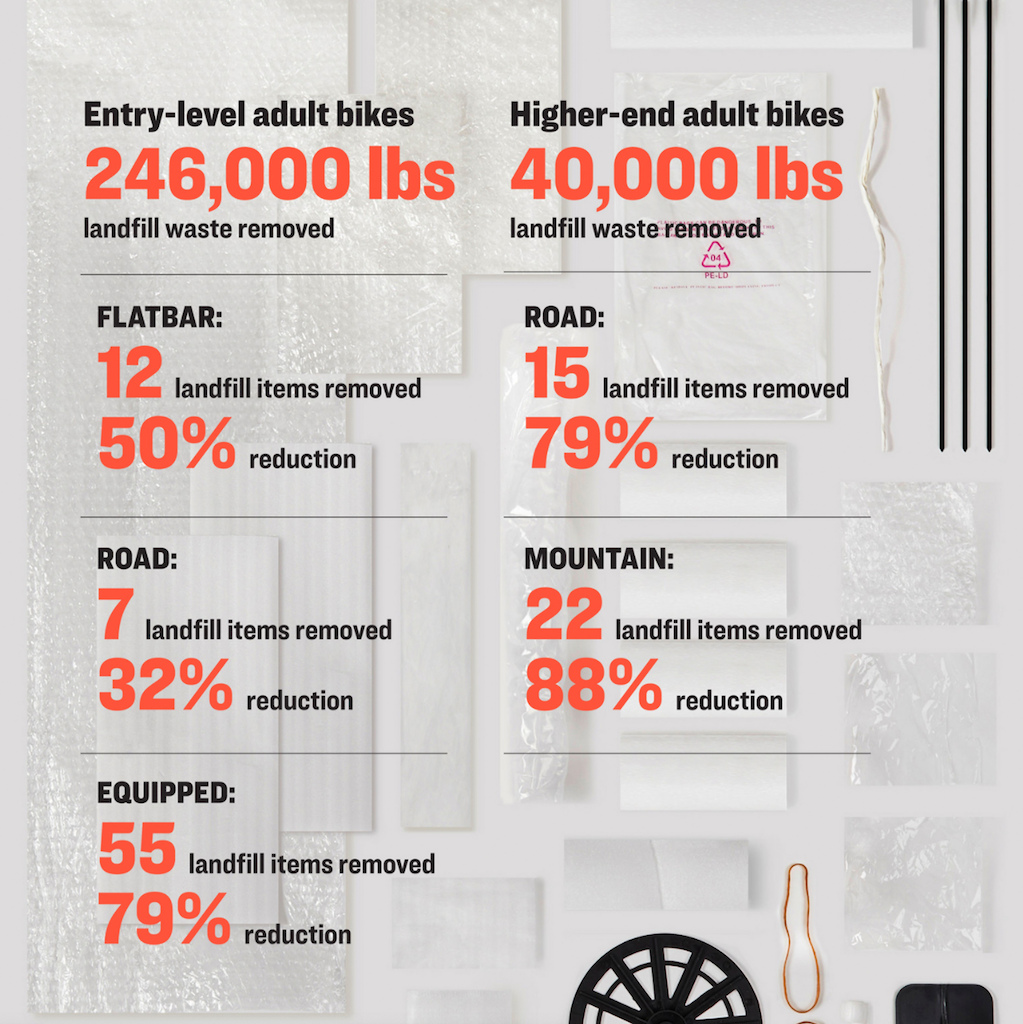
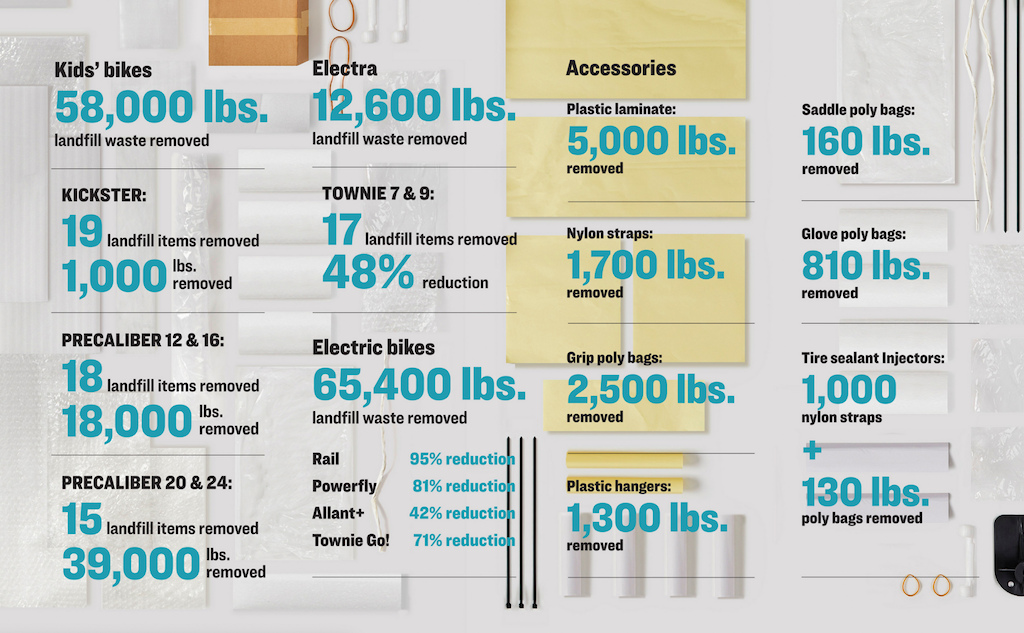

If you eat to remain weight neutral, the emissions associated with a regular British diet are reduced more by riding an e-bike than what is output in order to charge the batteries.
According to Bikeradar, at least: www.bikeradar.com/features/long-reads/cycling-environmental-impact
CO2 is code for "you are a sucker who believes everything you see on TV"
Worry about actual air pollution instead and don't be suckered into a fool's conversation about nothing.
Wow, just wow. How dumb are people?
I prefer milk.
and, secondly, the better you can REPAIR a bike, the lower the footprint. so, come in and offer us more carbon repair options
last: please offer recycling options for my old rig and parts, so take them in as return and dispose them in a circular way.
but: we're heading the right direction, so way to goo!
Do you hear me Shimano?
Carbon fiber, on the other hand, is virtually impossible to recycle. It is simply landfill. I know, theoretically you can recycle carbon fiber by burning off the resin. By the time you are done with that, you've used more energy than it needed in the first place, and are left with low-grade short fibers.
THIS.
In addition to that, I'd like to see more work done here that takes into account other environmental variables, like the usage of water in raw mat'l manufacturing. For instance, Lithium mines use up to 500k gallons of water per ton mined thru the salt evap process, and has a substantial potential to create a massive environmental disaster.
The second option for repair/replace parts or individual frames is a vastly better option in my opinion. This is better regardless of frame material. Logistics, extending product useful lifecycles, cutting down on raw material demand, et cetera..
I've seen another report which puts shipping emissions (by sea) at about 1% of the production emissions. My point is that the transportation component of emissions gets all the attention as it's one of the easiest to visualize, but it's probably one of the least important.
An aluminium bike can be melted down and the metal used again and again, surely?
Massive pile of metal and less than $50 to show for his trouble, but told him he did the hard thing & the right thing.
Ideally, stay a good bit behind the bleeding edge of technological progress. If something has become somewhat popular, it may stay available for a little bit longer.
A very good brake caliper with IS brake tabs is another example. If you were using a regular front IS caliper on the fork, you could get an adapter to mount it to a 6" PM fork and run a 180mm rotor. But if you were already using a rear brake caliper on the fork (to run a 180mm rotor) or if your new forks have 7" PM tabs, things become more difficult.
It is not the end of the world. Just saying that it may be one reason (for some) to not invest in the most durable gear. At this point I'm not worried about getting spares or replacements for my bike, even though I'm running 26" wheels and a 10sp drivetrain.
Would you rather ship raw aluminum to the US to make frames and then pay to ship individual components from all over the Asia continent to be shipped across the ocean individually? Or would you rather concentrate everything into a relatively small geographic area where things can go from raw material to end product with the shortest steps between facilities and only then ship large quantities of finished goods in a single container to their retail location?
This thought experiment will firstly lead you to why mature global industries tend to concentrate in one geographic region (think Detroit for cars or Silicon Valley for computers) and secondly it will show you several more reasons why it’s currently so much cheaper to buy bikes of any quality level from China that has nothing to do with human rights.
-sincerely, an annoyed supply chain engineer who hates this topic.
I am also an outlier in that I have started to make it my goal to buy as much Made in the US/ North America as I can. If a worker here can benefit from it, I am all about it. If you proudly put the California, Colorado, or whatever flag on your bike, and it is not made here, I will not buy it from you. "Designed in America" is not as impressive as "Designed and Manufactured in America" in my book. I have started with clothes (LC King and Redwing) and moving that philosophy into bikes. As stuff breaks, I am trying to source as much of it as possible from US/ North American based and manufactured companies. Will it cost more? Sure it will. Does that suck? Maybe but I know that someone can put food on their table because of me.
In this case, our supply chain is actually extremely clean given today’s level of technology. It will improve as technology improves and I’m glad Trek posts things like this in hopes that it stimulates more tech growth, but this madness about evil manufacturing monopolies is just lunacy.
This volume becomes more of a deal in case of extruded profiles and rim production in particular. In that case I'd say ideally the raw billets are shipped to the continent/area where the product is being finished. You don't really lose much material with aluminium extrusion but obviously the cross section area (hence the volume it occupies) does increase. Even more so when you bend it to a hoop. I don't know about North America, but I think in Europe the brands Ryde (Sapim), Mavic and DT Swiss do produce their own rims and as I live in The Netherlands, it makes sense to buy theirs. Now my current rims are Syntace MX35 but they're so similar to the Ryde Trace 29 OS (offset) rim that I think they're just rebranded.
Also good to realize that some brands already try to produce close to their customers. KMC (chains) already produces all over the world. And I noticed the Shimano Nexus 7sp geared hub on my commuter bike also states "Made in Europe". Not sure what part of it was produced here but at least some of it. Probably because these products are just used here primarily. Just because it says Shimano doesn't mean it is being made in southeast Asia.
Finally, I do agree about the environmental regulations which may be more strict in the US and Europe than they are in China. But I haven't really checked what they're like in Taiwan (sorry China), South Korea and Japan. And somehow it does feel ethically wrong to have a country to extract their natural resources but don't get them to actually add value to these raw materials. Especially as the mining is the most polluting part. If you only get them to do that, you're only allowing to do the "bad" stuff without balancing it with the "less bad".
Overall of course, it makes most sense to just invest in durable stuff. Stuff that either lasts or stuff that can be repaired. For instance I've got a Lupine Piko light from 2012 or so. They'd still repair it, current batteries still fit and they'll recycle old batteries. They do everything in house and their response is quick (except for their dog who I've mailed several times but never got a response. Could be I suck at barking.) I've heard Hope also continues to provide service for their older models. So that's one thing to keep in mind if you buy something like that. It may be a bit more expensive initially, but you're happy with how it performs then you should be using it for a good while. Unlike the cheaper brands where if something silly snaps or gets lost, it soon is cheaper to replace the complete product.
Hard for me to feel guilty driving my old oil burner to go ride my bike.
At least I am not having kids.
Net worth to be at the 50%ile in world wealth is a little over $4k. Net worth to be at the 99%ile is a little under $100K.
Be careful what you wish for.
So perhaps measuring wealth in a ponzi scheme is part of the problem?
Nevermind that big yellow hot thing that lights up our day and has a magnetic field that stretches beyond the reaches of the solar systems farthest planet. The same magnetic field that protects us from cosmic nasties yet has the power to drive weather and fry earth born systems when it coughs.
Yeah... It's our fault.
Best phrackin' comment yet!
Mean while, nobody here knows about things like CME's and that wobbly feeling.
Lol no I am joking, it's a really interesting insight ! Would be great to have other big boys from the industry doing the same thing. It would help confirm (or maybe not) some of the trends suggested by Trek.
Again, I don't mind mixing the different unit systems as long as you're aware of what you're working with. Mountainbike stuff is typically discussed in the English language yet so you may not see much mixing and matching here, but surely if people discuss mountainbikes in an other language, they'll still use English words. And it is all good. Use what's convenient or what people can relate to. So that may be a mix of different unit systems and different languages. I feel sorry for the person who goes ape shit when he or she hears a single word in another language.
To answer Vinay: The SI units are defined on consistent standards, not abritrary contructs, they use base 10 so way easier to use, 1 SI unit derives from others without any kind of conversion factor ... we can go on all day long on this, but that is not the subject.
SI units are just LOGICAL and used by 95% of the population on earth... but hey, maybe I am wrong...
Even those who are super pro-SI units rarely stick to their guns. I actually use the unit bar for pressure because I find it easier to relate to and the conversion to Pascal is easy, yet most on here stick with psi. Good, I can live with that. It isn't easier but apparently something most readers find easier to relate to. Similarly to measure angles in degrees. For geometry calculations it is actually more convenient to give angles in radians (in order to derive numbers like trail, saddle position etc). Yet apparently people find degrees easier to relate to and that's a valid reason. If people find it easier to relate to measuring length in inches and weight in stone then that's equally valid.
So again, just because they used different unit systems doesn't mean you can't trust the results.
If pregnancy were as difficult to ward of as, say, obesity, just think how hosed we'd collectively be.
The older I get, there more his brand of comedy resonates.
Time to buy another bike
We (humans) have very little say in that process. This planet has evolved and changed since its inception. Multiple ice ages, regions changing from fertile to desert, and desert to fertile, land masses exposed when water levels are low, land masses covered when water levels are high, land masses moving across the surface, multiple forms of life adapting to its new conditions throughout. Humans are just along for the ride for a couple hundred thousand years... a very short ride relative to this planets history and future.
Having kids also puts your skin in the game. You want a hopeless world for your kids? Your grandkids? Work to make it better, with your kids as motivation.
The world is only useful to any living being inasmuch as it supports life. We are not interested in “saving the Earth” for the sake of the earth itself. The earth itself will always exist, whether there’s life or not. The physical rock does not need saving. It’s its ability to sustain life that we need to worry about. It’s weird to me that extreme environmentalists separate humans from the Earth’s ecosystem, like we are some invasive species. No, we are a natural part of it.
I’m with you in the sense that yeah, consuming less would go a long way in helping make the environment better. But I’m not nearly as hopeless because in 300,000 years of human history, we have always found a way.
The intention to shift from consumerism/capitalism is not so save the planet or prevent its evolution (that's the guise... the bate and switch), its really to change societies from individual pursuits of happiness to collective centralized and controlled societies.
Really, when you think about it... how arrogant is it that humans think, or could be so easily influenced to believe that they can change the course of a planet that has existed and constantly evolved for 5 billion years? What's next... the Sun?
That said, nothing wrong with not wasting things, consuming less. Making things a little better bit by bit while we are here.
I think the real takeaway here is that in only 1000 miles of driving a car makes as much CO2 as building an entire carbon framed E bike. The average person in the USA drives 14000 miles, making as much CO2 as 14 whole ass carbon E bikes, more than one every month.
Doing better and reducing emissions of bicycle production is important and I applaud Trek for doing this but it is not the first place to look for carbon emissions savings.
The main thing that needs sorting (in the UK at least) is the road/cycle lane infrastructure and having adequate separation from vehicles. When that starts to happen, it will hopefully lead to the mass use and normalisation of bikes generally. Cyclists are widely hated on our roads at present, which is an attitude that must change.
So, you'll have made 2x the amount of CO2 used to build your frame by the time you do your first fork service.
I am not saying we should ignore these smaller sources of CO2, but it's a drop in the bucket compared to the 16 tons of CO2 the average person (who lives in North America and can afford a bike) can create. Let's prioritize the stuff that makes a difference first. This kind of meaningless distraction just prevents us from focusing on places where we actually _can_ make a difference that matters.
This reversion to locally-sourced bikes might be Trek's Waterloo unless they bring all mfg back onshore.
Then there's this...
www.newshub.co.nz/home/new-zealand/2021/09/fears-young-m-ori-being-targeted-by-white-supremacists-making-covid-19-vaccine-misinformation.html
As browner points out, the average bike's CO2 is still less than 585 miles of (average) vehicle transportation. Put that in your 3-row SUV when you drive to your favorite lift-assisted riding area.
While I appreciate that there are many people who dont care (because the impact hasnt yet hit their doorstep), there are some of us that want to make purchasing choices based on these factors. Just like Ive moved over to Endura because of their more ethical approach to running a bike business, this kind of report and the clear effort put in really does make me want to consider Trek as my next bike, whenever that is.
Sure Trek can try harder but you can only manage what you can measure and this shows effort and the correct direction of travel. I hope we see others following suit.
I have fond memories of my brother’s boron carbide Dean hardtail from that time. Same alloy mix as what was used in nuclear submarine ICBM tailfins and Apache helicopter armoured cockpits… that was the strongest 3 lb frame I’d ever ridden. Too bad it was so super stiff when compared to my steel hardtail, I felt like my fillings were coming loose when riding downhill. Might be good material for a full suspension bike though.
Thumbs up for TREK being public about their info gathered and what they are doing to improve things.
Thumbs down for Zuckerberg (FaceBook) on hiding their research of harm to the public/kids with FaceBook and Instagram.
“Recycled” or “picked apart and resold for a profit” doesn’t matter, point is we’re not putting oxidized lithium back into the dirt
I used to be the carbon almost everything guy. Cranks, bar, frame, wheels....now my bike is almost entirely metal. "Full Metal Bike" is what I call it. And I love the damn thing. Like I said, never going back.
The carbon bike wouldn't last more than 7-10 years. This bike will last a lifetime, and the carbon bike is being used by someone else who didn't buy a new bike, so go bugger yourself with your "virtue signaling" BS. Just because this issue is too complicated for you to understand doesn't mean you should attack someone else for trying to do the right thing. Jerk.
I’m all for ebikes as long as they are replacing combustion. If your emtb replaces the shuttle vehicle to the top it doesn’t take long to offset the CO2 and soon have a negative impact. I don’t own an ebike but they absolutely don’t bother me at all. I am also seeing more and more people commuting and stacking kids and groceries on ecargo bikes around my area and it’s great since every gallon of gas is 19 lbs of CO2 and 21 for diesel. A 700 lbs CO2 ebike offsets even an efficient car in a short time. At 40 MPG the ebike will offset the car in 1400 miles. Really in the US most cars and trucks get shit mileage so the offset is much earlier. Of course non of this considers the manufacturing of the auto…..
Also, additional props to Trek for doing what else they can, in terms of reducing packaging and switching to more environmentally sustainable shipping methods. I agree with you that governments, energy companies, and big investors can do even more, but each of us needs to look at what WE can do, instead of always just expecting others to do things for us. Accountability begins with oneself… start there, and THEN you might have enough moral high ground to ask others to do so as well.
"To achieve this lofty goal it (Trek) has come up with the idea of reducing the number of trips needed by predicting which products will be in highest demand throughout the year."
LOL, supply chain management has been around for decades, but this is a good idea they have!
en.m.wikipedia.org/wiki/Microplastics
This sustainability report isn't even slightly surprising (in any of the findings). I'm glad it's out there, though, genuinely. Now I wonder what the industry, including Pinkbike, will do about it. I'm pessimistic there'll be any real action- but you can start the grass roots movement, Pinkbike, if you're up to it.
I really appreciate trek for efforts to reduce carbon footprint, however we consume much more then mtb once in few years, so be mindful about your day to day choices make a difference, and then big manufacting country that do not give a S about kiot protocol will neglect your effort
We knew decades ago that larger wheels work better, we know we need wider hubs etc etc etc It's nothing new. Its basic 200/300 level engineering classes.
Cost comes from scarcity of materials and the energy needed to process them. Neither aluminum nor carbon are rare.
Energy is directly proportional to emissions.
If you haven't figured out that the only reason why they would publish a document like this is literally marketing, then my friend you are completely lost.
The only reason why they put out these statistics, is for you to subconciously identify with their brand and hopefully buy more of their products. That's it. They care about the environment as much as any other company would.
The actual environmentally responsible thing for them to do would be to ditch the yearly product cycle. But they won't do that, because, you know, money printer goes brrrr and that's all they care about.
F'em! Stop drinking the neo-capitlist coolaid
Financial success.
“Taste this session Apple, homegrown right where our poster of Brandon Semenuk used to be”
Now they selling alloy bikes direct to consumer, 20-60% more expensive than most online brands, and still riding that same marketing horse. For example for the new Meta SX, they claim that "once again, the choice to use Al allowed to update geometry", which just cannot sound honest to my ears : if alloy allows easy changes, why insist on manufacturing ill balanced bikes by having a common CS length for all sizes until now?
Bottom line : Commencal ditching carbon is far from being a decision solely made with environment friendliness in mind.
In seriousness— impressed with trek for commissioning and publishing this.
Let's not forget the most important things of all. It costs 3 times more than metal bikes and components and is 3 times more likely to break. It's also 3 times more likely to have bad wagon jumpers defending it. All in all its 3 times sh*tter than anything on a bike made out of the ultimate meterial called metal!!
Keep it real and stay metal...always!
Why is it so hard to say “aluminum”?
There is a reason "climate scientists" and i use that term very loosely only ever go back 20,000 years or so.
that was the end of the last Ice age (of which there have been many). very low Co2 meant that the earth reflected more solar energy than it absorbed due to not trapping heat in the atmosphere. temps drop ice sheets grow and reflect more heat away and hey presto ice age.
"climate scientists" have conveniently short memories when writing their new bang on trend papers (that say exactly what they need to say to keep that funding rolling in) and always leave out the part where average interglacial temperatures are around 14degrees higher than now.
TL;DR the planet isnt warming, its coming out of an ice age and returning to normal interglacial temperatures.
The planet may be coming out of an ice age, as you say, but geologic time and human scale time are starkly different phenomena. If I had real estate along the Bristol Channel, I’d put my house on stilts.
the whole concept of human driven climate change is pure arrogance, we are insignificant in the grand scheme of things.
I take it you don't like taxes...
More bike trails and bike parks = less trees
So less bike trails ?
Virtue signalling is the new black .
LoL Nice virtue signaling boys! This'll be sure to garner you some likes, clicks & sales.
ProTip: Stop pretending to give a shit and actually give a shit.
#thanoswasright
This emmissions shit is getting crazy.. There is ample evidence contrary to what main-stream is pushing with the CO2 warming narrative if one is interested in evidence rather than theory. Take also into account geologic data, the sun (the mayor driver of climate and life here, don't believe it?
Turn it off tomorrow and guess what happens) and all the complex system components that have made the CO2 level higher and lower for millions of years. But now it's us humans, because we are here now, and not hundreds and millions of years ago, that are causing the warming and a Tax is needed to qet rid of it... How covenient...
One thing is for sure, the earth and universe is and has always been changing, never has it been static, only stable for periods of time..
Science is never settled, always discovering, and we know so little about reality that the state of mainstream science today is a joke.
For starters,
principia-scientific.org/refuting-the-greenhouse-gas-theory
In here you can start at least to understand how unsettled climate theory is..see the comments in which various scientists dig deeper, more interesting links provided there..
Question everything...and keep getting dirty!